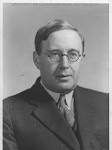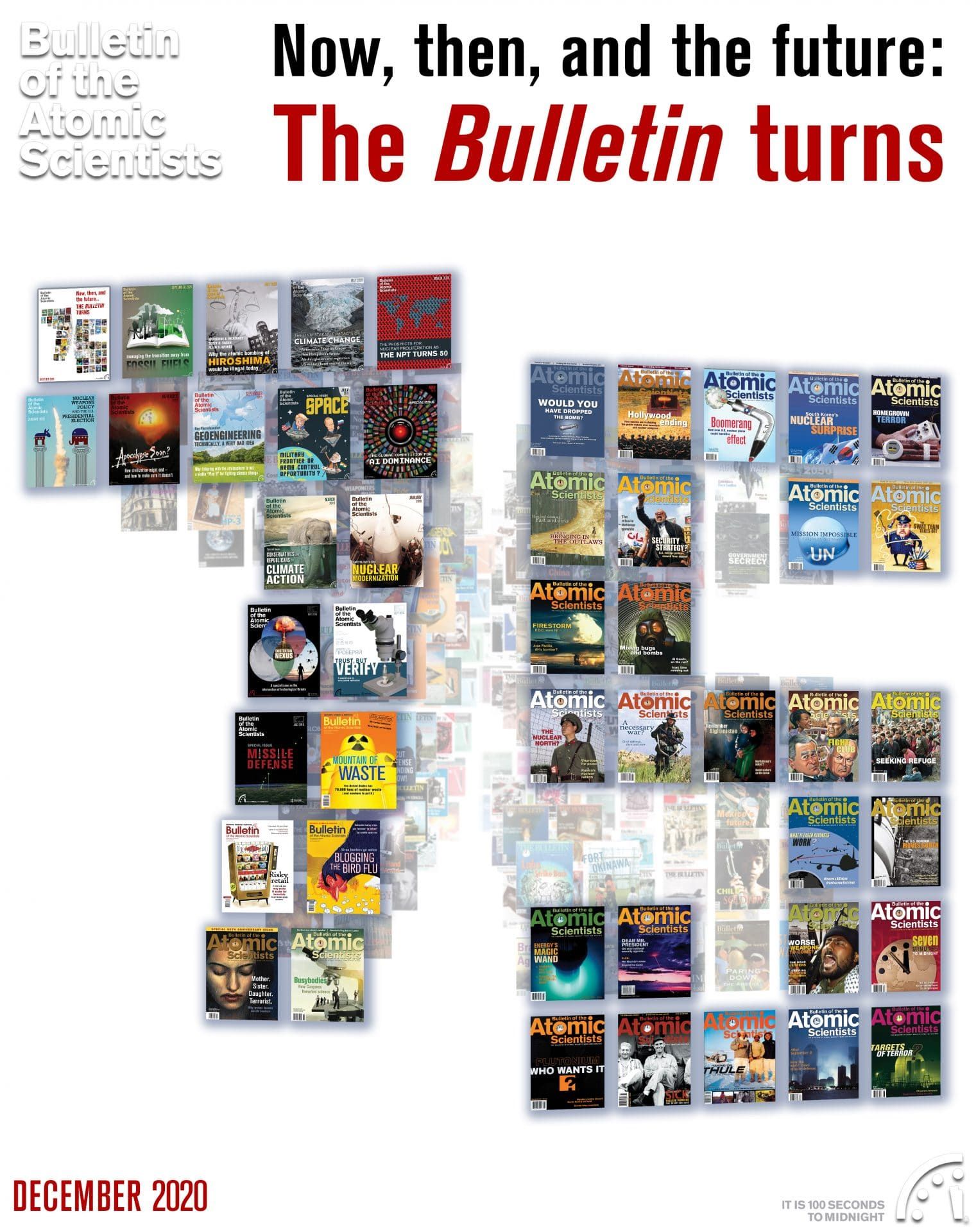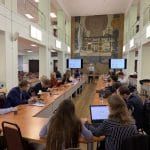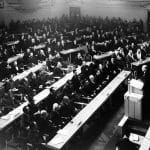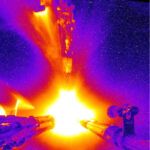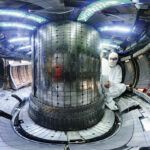1952: Ten years after
By Eugene Rabinowitch | December 7, 2020
1952: Ten years after
By Eugene Rabinowitch | December 7, 2020
Editor’s note: This article is adapted from a longer editorial appearing in the December 1952 issue of the Bulletin. It is republished here as part of our special issue commemorating the 75th year of the Bulletin.
Ten years ago, on December 2, atomic energy was first made available to man. The anniversary of the first self-supporting nuclear chain reaction was celebrated, in a rather subdued spirit, by the veterans of the historic experiment of December 2, 1942. The gathering was held in the squash court of the University of Chicago, where the first atomic pile had stood. Many newspapers carried editorials marking the anniversary—none too jubilant. No wonder—the celebration of the tenth anniversary of atomic energy had been ushered in, a month earlier, by a “shot heard around the world”! (With radiation counters, this is no longer a poetic exaggeration.) The first hydrogen bomb, or a reasonable prototype of such a bomb, went off at Eniwetok.
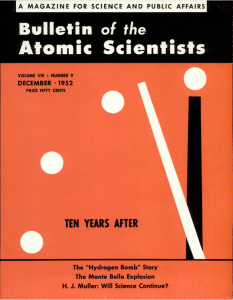 Within ten years, the military terror of atomic weapons—which appeared the ultimate imaginable at the time of Hiroshima—has been multiplied tenfold or more while the beneficial applications of atomic energy have fallen far short of popular expectation. Even the abundant supply of radioisotopes, which has been the main boon of atomic energy to science and industry, has yet to claim credit for a single really great discovery in biology, physics, or chemistry, or a single revolutionary cure in medicine. Feats of atomic engineering, such as destroying hurricanes, or leveling mountains with atomic explosives (the latter once rashly claimed by Vishinsky for the Soviet Union), have remained science fiction. Atomic power plants are still in the developmental stage, and when the first of them are ready—which may be a matter of two or three years—they will be either devoted entirely to military use (as in the case of the atomic submarine), or will owe their existence to military by-products (as in the presently planned nuclear power stations, which are to pay for the costs of their upkeep by the sale of plutonium to the government).
Within ten years, the military terror of atomic weapons—which appeared the ultimate imaginable at the time of Hiroshima—has been multiplied tenfold or more while the beneficial applications of atomic energy have fallen far short of popular expectation. Even the abundant supply of radioisotopes, which has been the main boon of atomic energy to science and industry, has yet to claim credit for a single really great discovery in biology, physics, or chemistry, or a single revolutionary cure in medicine. Feats of atomic engineering, such as destroying hurricanes, or leveling mountains with atomic explosives (the latter once rashly claimed by Vishinsky for the Soviet Union), have remained science fiction. Atomic power plants are still in the developmental stage, and when the first of them are ready—which may be a matter of two or three years—they will be either devoted entirely to military use (as in the case of the atomic submarine), or will owe their existence to military by-products (as in the presently planned nuclear power stations, which are to pay for the costs of their upkeep by the sale of plutonium to the government).
Ten years after the first chain reaction got under way in a makeshift laboratory, the country is dotted with new wonderful research laboratories. Their enormous buildings, equipped with all the modern facilities, where hundreds of well-paid PhD’s are flanked by assistants and technicians, draftsmen and machinists, their giant atom-smashing machinery, make the scientist who grew up in the austerity of pre-bomb laboratories, blink and rub his eyes in a mixture of admiration, envy, and misgivings. Most of the work done in these laboratories is good scientific work, inspired by the same urge to delve into the secrets of natural phenomena that has moved science throughout its history. But these laboratories exist not because the American people and the American government have learned to appreciate the material promise and spiritual value of broad, disinterested scientific research, but because a scared nation and a frightened Congress look to them for the production of ever better and ever bigger atomic weapons. One asks oneself: Would these great national research centers survive the shock of a sudden peace, or would they become ghost towns?
As piles of atomic bombs grow higher and more threatening, the quest for unattainable military security increasingly dominates political life everywhere. The dictatorships turn ever tighter the screws of oppression, destroying even the scant remnants of the freedom of movement and exchange of ideas that existed before 1945. Democratic states sacrifice many long-cherished freedoms: They introduce passport and visa restrictions and inquiries into opinions and associations of government and private employees. Police files accumulate on practically every citizen. Security zealots call for more and more purges and for conformism instead of dissent, which is the spice of democracy. This reversion to a past which free nations seemed to have left behind long ago, is, to a very large extent, the consequence of the fateful discovery of atomic energy.
It is a sad and terrifying picture. There is little satisfaction in the knowledge that this development was anticipated in 1944 by those who had tried, then, to weigh soberly the probable effects on human affairs of the release of atomic energy. In recording the early political discussions between scientists on the Manhattan Project, in re-reading the memoranda directed by them in 1944 and 1945 to President Roosevelt and to Secretary Stimson, one is painfully aware of how useless the foreknowledge of disaster has been.
The shock of the destruction of Hiroshima and Nagasaki, the disclosures of the Smyth Report, the frantic education of world public opinion by atomic scientists, have not been able to change decisively the behavior of states and nations. Again, as in the past, victors in a coalition war face each other as rivals for world supremacy. Once more a ruthless aggressive power, motivated by a Messianic ideology, despising and distrusting the rest of the world, risks its own destruction in the pursuit of a supposedly rational power policy. The terrific destructive power of nuclear explosives, while restraining the outbreak of open war, does not enhance the readiness to seek reasonable solutions to conflicts of power and ideology, but instead, exacerbates them and increases the pressures of fear, hate, and suspicion.
* * *
When the Bulletin of the Atomic Scientists was started in December 1945, there still was hope that the shock of the first atomic explosions, and the threat of their repetition on an enormously enlarged scale, could induce all political systems to adopt a policy of rational cooperation. Was not the threat of atomic destruction clear and obvious enough to make even the most hidebound or passion-blinded politician forget his pet hates and preconceived beliefs? The international control of atomic energy, and its development in the interest of all mankind, appeared then as a possible wedge to open the door into a new era. The chances for success were never high, but they were real; and the scientists were those who were most ardently hopeful.
 Scientists are not entirely rational, not even in their own work; but, among all professional groups, they are the ones most consistently forced to use rational thinking as the main guide of their activity. Their professional success depends on keeping all other influences under check. When scientists enter the public sphere, many of them become as emotional as the next man and equally susceptible to hatred or prejudice. Yet, on the average, scientists as a professional group are likely to bring into public affairs a little more rationality than is common to people whose very success in life more often than not depends on following irrational urges and exploiting irrational tendencies in human nature. The belief in the power of reason to influence the behavior of nations made scientists hopeful of a successful solution to the problem of atomic energy control.
Scientists are not entirely rational, not even in their own work; but, among all professional groups, they are the ones most consistently forced to use rational thinking as the main guide of their activity. Their professional success depends on keeping all other influences under check. When scientists enter the public sphere, many of them become as emotional as the next man and equally susceptible to hatred or prejudice. Yet, on the average, scientists as a professional group are likely to bring into public affairs a little more rationality than is common to people whose very success in life more often than not depends on following irrational urges and exploiting irrational tendencies in human nature. The belief in the power of reason to influence the behavior of nations made scientists hopeful of a successful solution to the problem of atomic energy control.
The hope has failed. Ten years after Hiroshima the world presents a picture, not of progress toward cooperation, but of tremendous strife, fanned by the primitive lust for power, and by mass passions of nationalism, class and race hatred, envy, and suspicion.
* * *
As this situation developed, many scientists lost their belief in the usefulness of continuously educating the world to the realities of the atomic age. Some among the friends of the Bulletin have counseled it to quit, and to leave mankind to its folly. Others—the majority—have urged it to go on. Where sudden shock treatment has failed, slow education might yet bring unspectacular, but important success. The fear of atomic destruction, while it gives no hope for permanent avoidance of an all-out war, at least raises what chemists might call “the activation energy” needed to begin a war, and permits an unstable state of world tension to exist much longer than would have seemed possible in the past. We may thus have more time for reflection, and for the slow building-up of a rational society, than many people are inclined to believe.
A closer look at the developments of the last ten years shows that the lessons of the atomic bomb have not been entirely lost on mankind. A trend toward unification, toward leaving behind age-old national hatred and rivalries, is apparent among the nations of the West. In America, the first wave of an easy internationalism, which expressed itself in the many resolutions for world government passed by numerous state legislatures immediately after the war, has been dissipated; but a widespread progress in thinking on international matters, and a growing realization of American responsibility for the rational reorganization of the world, have remained. An understanding of the decisive role of science and technology in national and international developments, and of the possibility of utilizing the methods of science in public policy, is slowly emerging, even if it is continuously threatened by the wave of anti-scientific prejudice, released by the fear of atomic war, and the loss of American atomic secrets. The advances are small and far from secure. If the scientists, in general, and the Bulletin editors in particular, can contribute toward protecting and enlarging them, they have, perhaps, no right to retire in resignation and despair to their laboratories.
* * *
The problem has long since ceased to be entirely one of the use of atomic energy and, as such, of interest only to “atomic scientists.” It has become one of the role of science and technology as a whole in national and international affairs, and is of equal concern to all physicists, chemists, biologists, and agricultural, engineering, and social scientists. For several years now, the Bulletin of the Atomic Scientists has carried the subtitle “Magazine for Science and Public Affairs.” We are considering whether it might not be advisable to make this the main title of the magazine, keeping the subtitle “Bulletin of the Atomic Scientists,” in recognition of the historic fact that it was the explosion of the first atomic bomb that has led to a decisive change in the political consciousness of scientists, and that the physicists and chemists emerging from the Manhattan Project, were the first to carry this spirit of social and political responsibility into public life.
Together, we make the world safer.
The Bulletin elevates expert voices above the noise. But as an independent nonprofit organization, our operations depend on the support of readers like you. Help us continue to deliver quality journalism that holds leaders accountable. Your support of our work at any level is important. In return, we promise our coverage will be understandable, influential, vigilant, solution-oriented, and fair-minded. Together we can make a difference.
Keywords: archive75
Topics: Nuclear Energy, Nuclear Weapons
